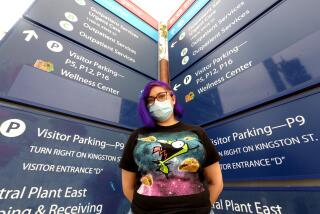Psychiatric Care at the Right Price : Mental Health: For $15 or less per visit, the volunteer staff at Airport Marina Counseling Services provides patients with affordable therapy.
- Share via
WESTCHESTER — Laid off a few months ago from his middle-management job at an aerospace firm, Bob, 52, began to have panic attacks. When he tried to drive on the freeway, his heart raced, his palms sweated and he feared that the car would swerve out of control.
All his life Bob has mastered every challenge that came his way. Now, he can barely drive to the supermarket.
Cristina, 21, is the first in her family to attend college. Her grades are good, but she worries that she will be unable to find work in her field after graduation--and unable to repay the loans from family members that put her through school. The boyfriend she had hoped to marry just broke off their relationship. She has already attempted suicide once.
Neither has the means--or the insurance coverage--to seek help at a private mental health clinic, where fees may run anywhere from $80 to $120 per hour; nor are their mental illnesses severe or persistent enough to qualify for treatment at one of Los Angeles County’s clinics.
They can, however, find the help they need at Airport Marina Counseling Services in Westchester. And Bob and Cristina, whose names have been changed and details of their cases modified to protect their privacy, will probably pay less than $15 for their visits.
The counseling center, now in its 32nd year, provides these services to more than 400 patients a week. Remarkably, it does so without any government or major charity funding.
Nearly all patient services are provided by unpaid therapists. Most are interns and graduate students in psychology or social work who are working toward their state licensing, which requires at least 3,000 hours of field experience under the supervision of a licensed practitioner in an approved mental health facility.
While many clinics permit interns to practice in their facilities, few rely on them so heavily to treat patients. Moreover, the majority of the practitioners who supervise the interns are volunteers, as are many of the administrators.
A shoestring budget, a huge caseload, a heavy reliance on volunteers--it could be a recipe for disaster. Somehow, though, Airport Marina Counseling Services runs one of the most highly regarded psychiatric teaching programs in the state.
“Our students are very pleased with Airport Marina,” said Dr. Micki Lackey, director of field education for USC’s School of Social Work. “They get high-quality individual supervision and . . . because (AMCS) uses so many trainees to deliver services, they’ve developed a very sophisticated group (training) plan.”
The training program consists of structured teaching sessions, as well as seminars in which students from a variety of educational backgrounds are able to share knowledge. This broadens and reinforces the hands-on experience interns obtain in counseling the center’s clients.
“It’s a very demanding place because (trainees) see lots of clients,” Lackey said, “but it’s very supportive because they get a lot of supervision and they feel really cared about there.”
Lorraine D’Angelo, a therapist-intern who has put in 18 to 20 hours a week at the counseling center for 2 1/2 years, says this caring attitude is an important ingredient in the clinic’s success.
“This is one of the few clinics that not only trains, but encourages us to participate, get involved in the clinic. The environment here is good modeling for what we should be doing with our patients,” D’Angelo said. “Working here, with my supervisor, is almost like being in therapy for me. How they deal with me teaches me how to deal with my clients. I’ve learned skills (here) that I could read about in school, and memorize for a test, but it’s different when you’re in the room with a client.”
D’Angelo credits the clinic’s top management for this unique situation: Executive Director Fran Cucity, a social worker, and Clinical Director Donna Sexsmith, a psychologist, two of only six full-time, paid employees at the clinic.
Sexsmith, formerly director of the family and child practice at Didi Hirsch Community Mental Health Center in Culver City, has been at Airport Marina for 13 years. Her goal as a manager, she said, is to “create an environment where people can learn and grow.” The key, she said, is being interested in each trainee and in the trainee’s development as a therapist.
The licensed therapists who donate their time as supervisors say they too benefit from their association with the clinic. Most are practicing therapists who find their work at Airport Marina Counseling Services a welcome respite from the loneliness of private practice as well as a means to remain current in their field.
“For me, supervising interns is really the most satisfying kind of teaching,” said Natalie Nixon, a volunteer supervisor since 1985. “It may seem idealistic, but that’s the way you make an impact on the profession for the future.”
A psychotherapist and psychiatric social worker for 28 years, Nixon said has found the clinic to be “one of the very few places where professional volunteers really function as professionals.”
The clinic’s independence from government funding and its heavy reliance on volunteers have insulated it to some extent from the effects of the recession and the chronic shortage of money that has beset public sector mental health facilities in recent years.
But the public sector’s crisis can’t help but have some effect on community agencies. Dr. Millard Ryker, executive director at the Didi Hirsch facility in Culver City, said the cuts in government funds are causing some people with chronic or severe mental illness who once would have been served by government-funded facilities to seek help in the private sector.
Cucity confirms that this is happening at Airport Marina Counseling.
“My concern,” she said, “is that as some of those (severely ill) people bring their problems to us, which really can’t go unattended, where does the person with the superficial marital problem go? We do see an increasing number of those folks, and they are going to eventually bump out the other population. . . . We have a significant waiting list (now).”
The commitment to their home community is not one the clinic staff takes lightly. A major portion of their $600,000 annual budget comes from contributions and fund-raising activities within the Westchester-Airport-Marina area, including an annual home tour, a 10K race and an all-volunteer-staffed retail gift shop. Additionally, local residents donate their labor at the center for everything from bookkeeping to minor carpentry and locksmith services.
“They get a lot of benefit from feeling that they’re doing something very purposeful,” said Sexsmith of the center’s army of volunteers. “The people on the front desk, the people that come and stuff envelopes, the people in the community that work here--it represents something to them that they’re doing for the community that’s very beneficial. . . . They’re helping their own community by volunteering.”


